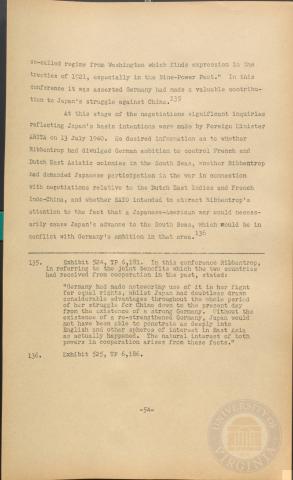
Page 54
| Parent | Japanese - German - Italian Collaboration |
|---|---|
| Date | |
| Language | English |
| Collection | Tavenner Papers & IMTFE Official Records |
| Box | Box 14 |
| Folder | Japan, Germany, Italy Collaboration and Introduction |
| Repository | University of Virginia Law Library |
so-called regime from Washington which finds expression in the treaties of 1921, especially in the Nine-Power Pact." In this conference it was asserted Germany had made a valuable contribu- tion to Japan's struggle against China. 135
At this stage of the negotiations significant inquiries reflecting Japan's basic intentions were made by Foreign Minister ARITA on 13 July 1940. He desired information as to whether Ribbentrop had divulged German ambition to control French and Dutch East Asiatic colonies in the South Seas, whether Ribbentrop had demanded Japanese participation in the war in connection with negotiations relative to the Dutch East Indies and French Indo-China, and whether SATO intended to attract Ribbentrop's attention to the fact that a Japanese-American war would necess¬arily cause Japan's advance to the South Seas, which*would be in conflict with Germany's ambition in that area. 136
135Exhibit 524, TP 6.181. In this conference Ribbentrop,
in referring to the joint benefits which the two countries had received from cooperation in the past, stateds
"Germany had made noteworthy use of it in her fight for equal rights, whilst Japan had doubtless drawn considerable advantages throughout the whole period of her struggle for China down to the present day from the existence of a strong Germany. Without the existence of a re-strengthened Germany, Japan would . not have been able to penetrate as deeply into English and other spheres of interest in East Asia as actually happened. The natural interest of both powers in cooperation arises from these facts."
136 Exhibit 525, TP 6,186.
